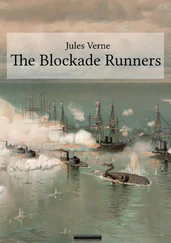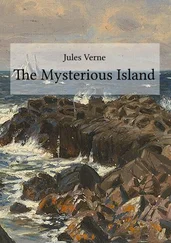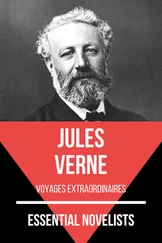“We are lost!” cried Shandon, who could not retain the imprudent words.
“Lost!” repeated the crew.
“Let them escape who can!” said some.
“Lower the shore boats!” said others.
“To the steward’s room!” cried Pen and several of his band, “and if we are to be drowned, let’s drown ourselves in gin!”
Disorder among the men was at its height. Shandon felt himself overcome; when he wished to command, he stammered and hesitated. His thought was unable to make way through his words. The doctor was walking about in agitation. Johnson stoically folded his arms and said nothing. All at once a strong, imperious, and energetic voice was heard to pronounce these words:
“Every man to his post and tack about!”
Johnson started, and, hardly knowing what he did, turned the wheel rapidly. He was just in time, for the brig, launched at full speed, was about to crush herself against her prison walls. But while Johnson was instinctively obeying, Shandon, Clawbonny, the crew, and all down to the stoker Warren, who had abandoned his fires, even black Strong, who had left his cooking, were all mustered on deck, and saw emerge from that cabin the only man who was in possession of the key, and that man was Garry, the sailor.
“Sir!” cried Shandon, becoming pale. “Garry—you—by what right do you command here?”
“Dick,” called out Garry, reproducing that whistle which had so much surprised the crew. The dog, at the sound of his right name, jumped with one bound on to the poop and lay quietly down at his master’s feet. The crew did not say a word. The key which the captain of the Forward alone possessed, the dog sent by him, and who came thus to verify his identity, that commanding accent which it was impossible to mistake—all this acted strongly on the minds of the sailors, and was sufficient to establish Garry’s authority.
Besides, Garry was no longer recognisable; he had cut off the long whiskers which had covered his face, which made it look more energetic and imperious than ever; dressed in the clothes of his rank which had been deposited in the cabin, he appeared in the insignia of commander.
Then immediately, with that mobility which characterised them, the crew of the Forward cried out—“Three cheers for the captain!”
“Shandon!” said the latter to his second, “muster the crew; I am going to inspect it!”
Shandon obeyed and gave orders with an altered voice. The captain advanced to meet his officers and men, saying something suitable to each, and treating each according to his past conduct. When he had finished the inspection, he returned on to the poop, and with a calm voice pronounced the following words:
“Officers and sailors, like you, I am English, and my motto is that of Nelson, ‘England expects that every man will do his duty.’ As an Englishman I am resolved, we are resolved, that no bolder men shall go further than we have been. As an Englishman I will not allow, we will not allow, other people to have the glory of pushing further north themselves. If ever human foot can step upon the land of the North Pole, it shall be the foot of an Englishman. Here is our country’s flag. I have equipped this vessel, and consecrated my fortune to this enterprise, and, if necessary, I shall consecrate to it my life and yours; for I am determined that these colours shall float on the North Pole. Take courage. From this day, for every degree we can gain northwards the sum of a thousand pounds will be awarded to you. There are ninety, for we are now in the seventy-second. Count them. Besides, my name is enough. It means energy and patriotism. I am Captain Hatteras!”
“Captain Hatteras!” exclaimed Shandon, and that name, well known to English sailors, was whispered amongst the crew.
“Now,” continued Hatteras, “anchor the brig to the ice, put out the fires, and each of you return to your usual work. Shandon, I wish to hold a council with you relative to affairs on board. Join me with the doctor, Wall, and the boatswain in my cabin. Johnson, disperse the men.”
Hatteras, calm and haughty, quietly left the poop. In the meantime Shandon was anchoring the brig.
Who, then, was this Hatteras, and for what reason did his name make such a profound impression upon the crew? John Hatteras was the only son of a London brewer, who died in 1852 worth six millions of money. Still young, he embraced the maritime career in spite of the splendid fortune awaiting him. Not that he felt any vocation for commerce, but the instinct of geographical discoveries was dear to him. He had always dreamt of placing his foot where no mortal foot had yet soiled the ground.
At the age of twenty he was already in possession of the vigorous constitution of a thin and sanguine man; an energetic face, with lines geometrically traced; a high and perpendicular forehead; cold but handsome eyes; thin lips, which set off a mouth from which words rarely issued; a middle stature; solidly-jointed limbs, put in motion by iron muscles; the whole forming a man endowed with a temperament fit for anything. When you saw him you felt he was daring; when you heard him you knew he was coldly determined; his was a character that never drew back, ready to stake the lives of others as well as his own. It was well to think twice before following him in his expeditions.
John Hatteras was proud of being an Englishman. A Frenchman once said to him, with what he thought was refined politeness and amiability:
“If I were not a Frenchman I should like to be an Englishman.”
“And if I were not an Englishman,” answered Hatteras, “I should like to be an Englishman.”
That answer revealed the character of the man. It was a great grief to him that Englishmen had not the monopoly of geographical discoveries, and were, in fact, rather behind other nations in that field.
Christopher Columbus, the discoverer of America, was a Genoese; Vasco da Gama, a Portuguese, discovered India; another Portuguese, Fernando de Andrada, China; and a third, Magellan, the Terra del Fuego. Canada was discovered by Jacques Cartier, a Frenchman; Labrador, Brazil, the Cape of Good Hope, the Azores, Madeira, Newfoundland, Guinea, Congo, Mexico, Cape Blanco, Greenland, Iceland, the South Seas, California, Japan, Cambodia, Peru, Kamtchatka, the Philippines, Spitzbergen, Cape Horn, Behring’s Straits, Tasmania, New Zealand, New Brittany, New Holland, Louisiana, Jean Mayen Island, were discovered by Icelanders, Scandinavians, French, Russians, Portuguese, Danes, Spaniards, Genoese, and Dutch, but not one by an Englishman. Captain Hatteras could not reconcile himself to the fact that Englishmen were excluded from the glorious list of navigators who made the great discoveries of the 15th and 16th centuries.
Hatteras consoled himself a little when he turned to more modern times. Then Englishmen had the best of it with Sturt, Burke, Wills, King, and Grey in Australia; with Palliser in America; with Cyril Graham, Wadington, and Cummingham in India; with Burton, Speke, Grant, and Livingstone in Africa.
But for a man like Hatteras this was not enough; from his point of view these bold travellers were improvers rather than inventors ; and he was determined to do something better, and he would have invented a country if he could, only to have the honour of discovering it. Now he had noticed that, although Englishmen did not form a majority amongst ancient discoverers, and that he had to go back to Cook in 1774 to obtain New Caledonia and the Sandwich Isles, where the unfortunate captain perished in 1778, yet there existed, nevertheless, a corner of the globe where they seemed to have united all their efforts. This corner was precisely the boreal lands and seas of North America. The list of Polar discoveries may be thus written:
Читать дальше












